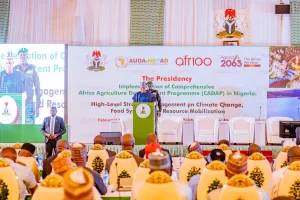The crucial role of the commodity board and food banks have been stressed. It is on this basis that the Federal Government said that plans are on the way to establish a National Commodity Board as a solution to the escalating food prices in the country. The commodity board would assess and regulate food prices, as well as maintain a strategic food reserve for stabilising prices of crucial grains and other food items.
Vice President Kashim Shettima made known this plan during a two-day high-level strategic meeting on climate change, food systems and resource mobilisation at the Presidential Villa, Abuja. Speaking on “Climate Resilience and Food Security: Nigeria’s Vision for the Future”, Senator Shettima said the event was an attestation of Nigeria’s efforts at mitigating the effects of climate change and ensuring food security. Shettima, who highlighted ongoing policy reforms by the administration to ensure food and water availability and affordability, said the solution “to the potential food crisis has become immediate, medium, and long-term strategies”, adding that the short-term strategy entails revitalising food supply through specific interventions like the distribution of fertilizers and grains to farmers and households to counteract the effects of subsidy removal; and addressing price volatility by establishing a National Commodity Board.
He said: “This board will continually assess and regulate food prices, maintaining a strategic food reserve for stabilising prices of crucial grains and other food items”. The Vice President assured that while the Tinubu administration was fully invested in the restoration of degraded lands, as there are ongoing plans to restore four million hectares, or nearly 10 million acres, of degraded lands within the nation’s borders as its contribution to the AFR100 Initiative. On how the government is handling the security challenges that have prevented farmers from working on their farms, he said, “I wish to assure you that we will engage our security architecture to protect the farms and the farmers so that farmers can return to the farmlands without fear of attacks”. He implored those at the event, including development partners, private investors and the diplomatic community, among others, to make sure the high-level engagement results in a positive outcome.
In a related development, a case has been made for Nigeria to have food banks in all six geopolitical zones to attain sustainable food security and effectively tackle the rising food prices across the country, the All Farmers Association of Nigeria (AFAN), has said. AFAN has advised the federal and state governments to establish food banks in all regions as this would guarantee the availability of the necessary staple that effectively suits the food demands of citizens in each region. The President of AFAN, Kabir Ibrahim stated that the one-off releases from the National Food Reserve by the Federal Government was commendable, but noted that releases were basically dried grains such as wheat, millet and maize. “The release of grains is no doubt commendable, but will these grains meet the food variety requirements of citizens in the different states? For instance, do you think that dried maize would meet the food variety needs of people in Imo State?
“So beyond the one-off releases from the strategic reserves, Nigeria actually needs veritable food banks in all six geopolitical zones for the attainment of sustainable food security”, Ibrahim added. A few weeks ago, President Bola Tinubu had ordered the immediate release of more than 102,000 metric tonnes of various grain types from the National Food Reserve and the Rice Millers Association of Nigeria as a temporary response to the nation’s mounting food crisis and high cost of commodities. The Minister of Information and National Orientation, Mohammed Idris, had disclosed this to State House correspondents after the last leg of a series of meetings of the Special Presidential Committee on Emergency Food Intervention at the Aso Rock Villa.
Idris said, “The first one is that the Ministry of Agriculture and Food Security has been directed to release about 42,000 metric tons of maize, millet, garri, and other commodities in their strategic reserve so that these items will be made available to Nigerians; 42,000 metric tonnes immediately. The second one is that we have held meetings with the Rice Millers Association of Nigeria. Those who are responsible for producing this rice and we have asked them to open up their stores. They’ve told us that they can guarantee about 60,000 metric tonnes of rice. This will be made available and we know that that is enough to take Nigerians the next one month to six weeks, perhaps up to two months”. The AFAN President, however, informed that a veritable food system for Nigeria would evolve by committing to the proper and sustainable creation of a number of factors including food production, processing and consumption.
He noted that for efficient food production, farmers need adequate security to be able to go to their farms without hindrance. “There is also the need for us to maximise our ability to process agricultural produce and ensure efficient value addition that would bolster sufficiency, reduce importation and most probably enhance agro exports in the long run. However, all these require the complete repositioning of the energy sector to effectively function”, Ibrahim stated. The AFAN President also called for the provision of cold storage facilities for food, as well as efficiently managed dry storage, as these would “reduce post-harvest losses and extend the shelf lives of farm produce and should be pursued vigorously”. He pointed out that the regional food banks would support effective and efficient distribution of farm produce and processed products from the place of production to the place of need, stressing that this was key to an efficient food system.
“On consumption, it is important to note that a very good and controlled consumption of food will reduce waste and the emission of methane from decayed foods, which are threat factors to the mitigation of climate change that is a global challenge to the attainment of food security. These parameters must be pursued by the federal and state governments as well as Federal Capital Territory and the 774 local government areas of Nigeria to be sustainably impactful in our quest for food security”, Ibrahim stated. The National Food Reserve Agency, is a decentralised storage system across the country that stores mostly dried grains. AFAN is calling for food banks that would store both grains and other forms of non-dried foods. This is because the country has community seed banks, which are organised by farmer associations or individual farmers, as these smaller-scale reserves target is to preserve local crop varieties and ensure planting materials for future seasons.

